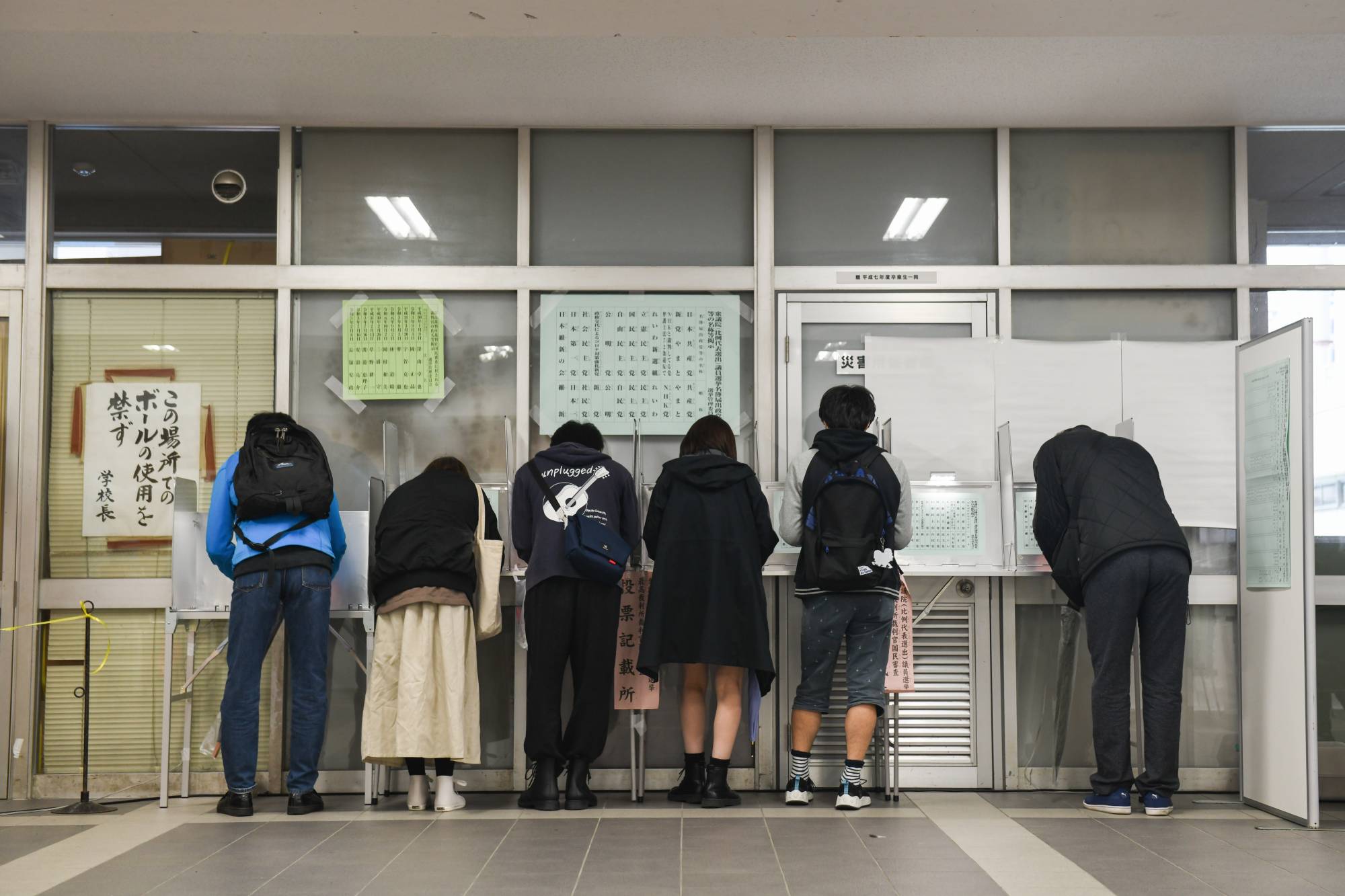The ruling Liberal Democratic Party was on course to secure a simple majority in the Lower House election on Sunday, according to an NHK projection, a satisfactory outcome for Prime Minister Fumio Kishida in his first major test as leader.
The broadcaster projected that the LDP will win at least 233 seats against the 276 it had before the election. The party’s coalition partner Komeito will get somewhere between 27 and 35 seats, compared with the 29 seats it had at the Diet’s dissolution.
If it reaches an “absolute stable majority” of 261, a scenario under which all standing committees could be chaired by a ruling party member and the majority of all committee members could belong to the ruling coalition — it will enable the ruling parties to pass bills smoothly.
But the coalition will still be left with a reduction in parliamentary seats, considering the coalition held a total of 305 seats before.
Symbolizing the LDP’s fortunes in the election, LDP Secretary-General Akira Amari is projected to lose his Kanagawa No. 13 electoral district against a CDP candidate, dealing a heavy blow to Kishida. Earlier in the night, Amari said he would leave it up to Kishida to replace him as secretary-general — the party’s No. 2 man — if he was defeated.
In another upset, party veteran Nobuteru Ishihara lost in the Tokyo No. 8 district, where he was defeated by a unified candidate backed by the opposition, Kyodo News reported.
Nonetheless, Kishida stressed that the ruling coalition had earned a mandate from the public.
“Lower House elections are always elections to choose a governing party. If the ruling coalition has ensured a majority, I would take it as a vote of confidence,” Kishida told NHK.
Still, he acknowledged unified opposition candidates posed challenges for LDP candidates in single-seat constituencies.
Meanwhile, it is looking to be a happier night for the opposition. The NHK survey projected the Constitutional Democratic Party of Japan (CDP) will secure between 99 and 141 seats, compared with a pre-election strength of 109.
“Since the single-seat constituency system is based on creating a structure for a one-on-one fight, we as the largest opposition party have solicited understanding and cooperation from other opposition parties as we determine it is the goal we should be striving for,” said Yukio Edano, CDP leader, on NHK. “As a result, we were able to bring the election to a close race in many constituencies, so I believe (unifying the opposition candidates) was effective to a certain degree.”
Edano said the party will demand the LDP and Komeito listen to the opposition’s arguments and to run Diet affairs “with civility.”
A notable change in this election is the remarkable advance of right-leaning Nippon Ishin no Kai as a “third pole,” with the group becoming a favorite pick for voters dissatisfied with both the ruling coalition and left-leaning opposition parties. Nippon Ishin is expected to win between 34 and 47 seats, according to the NHK exit poll, an at least threefold increase from its tally before the election, which was 11. The party, which originated in Osaka and is run by Osaka Mayor Ichiro Matsui, apparently gave a strong showing in the western prefecture.
The party fielded 94 candidates nationwide, an increase of more than 40 compared with the last general election in 2017.



According to Kyodo’s exit poll, among those who identified themselves as nonaffiliated voters, 24% backed the CDP under the proportional representation system, in which voters cast their ballot for a party, while 20% voted for Nippon Ishin and 17% the LDP.
It also indicated that perceptions of the government’s coronavirus response had a clear impact on how voters made their decision. Among those who voted for the LDP under proportional representation, 78% viewed the government’s COVID-19 measures favorably, while 61% of those who voted for the CDP viewed them poorly.
Despite a better-than-projected performance at the polls on Sunday, the road ahead for Kishida is expected to be difficult.
The ruling coalition’s total number of seats will decrease from 305, forcing the two ruling parties to work even more closely to smoothly pass bills and budgets. They may be tempted to put issues where their policies diverge, including defense and constitutional amendment, on the back burner to avoid any internal fallout, which could leave conservative lawmakers in the LDP dissatisfied with Kishida’s leadership.
Unless the LDP wins comfortably in next year’s Upper House election, Kishida will remain in a somewhat shaky position at the top, leaving him vulnerable to potential challenges from within the party to oust him should his support continue to slip in the coming months.
In the meantime, Kishida will face the daunting challenge of rallying a skeptical public to his side in order to fulfill his campaign pledges, especially his promise to empower the middle class by generating a positive cycle of growth and distribution to raise wages. Kishida has stressed the importance of trust and empathy and he frequently held dialogue sessions with ordinary citizens on the campaign trail.
When the Diet is reconvened, Kishida is expected to immediately compile an economic stimulus package that would be approved by the end of the year.



The center- and left-leaning opposition parties might have been hoping for a better performance, but their initiative to consolidate many of their candidates can be called a moderate success. The five parties — the CDP, the JCP, the DPP, the SDP and Reiwa — have fielded unified candidates in more than 210 single-member districts to avoid splitting the opposition vote.
In past Lower House elections, similar efforts were unsuccessful, primarily because the opposition parties were divided. Although the CDP and JCP have fundamental differences in their views on diplomatic and defense issues, this time they prioritized defeating the LDP and Komeito — their common political foe.



Kishida announced that he would dissolve the House of Representatives on the same day he came to power on Oct. 4. With Lower House lawmakers’ terms approaching their expiration on Oct. 21, the prime minister insisted on holding the election as early as possible to minimize a political vacuum at a time when the nation is reeling from the pandemic and facing growing national security threats from neighboring countries. The Lower House was dissolved on Oct. 14.
A potentially important factor in the outcome is the notable nationwide drop in COVID-19 cases seen in recent weeks.
The LDP’s prospects of winning seats and maintaining a sufficient majority would likely have been diminished in a situation where the daily virus figures were rising again as the country headed into winter, based on trends under the previous administration, which saw the Cabinet’s approval ratings fall as coronavirus cases rose.
Kishida replaced Yoshihide Suga, whose approval ratings had plummeted to dangerous levels as Suga struggled to contain record coronavirus numbers over the summer even though the figures were considerably lower than Western countries.
In a time of both misinformation and too much information, quality journalism is more crucial than ever.
By subscribing, you can help us get the story right.
SUBSCRIBE NOW


